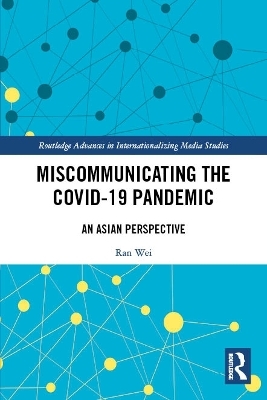
Miscommunicating the COVID-19 Pandemic
Routledge (Verlag)
978-1-032-41047-0 (ISBN)
- Lieferbar (Termin unbekannt)
- Versandkostenfrei
- Auch auf Rechnung
- Artikel merken
This book tackles the infodemic—the rapid, widespread diffusion of false, misleading, or inaccurate information about the disease and its ramifications—triggered by the COVID-19 pandemic. With a focus on four Asian societies, the book compares and analyzes the spread of COVID-19 misinformation and its broad impacts on the public in Beijing, Hong Kong, Taipei, and Singapore.
Providing both a comprehensive overview of the phenomenon of misinformation and cross-societal analyses of patterns, the book features in-depth analyses of the prevalence of COVID-19 misinformation and engagement and explores its consequences in an Asian context. The book sheds lights on these key questions:
What types of infodemic messages circulate widely on popular social media platforms?
What factors account for exposure to and engagement with debunked yet popular COVID-19 misinformation?
How does exposure to widely circulated COVID-19 misinformation affect people’s beliefs, attitudes, and adoption of preventive measures to cope with the pandemic?
How do macro social differences condition the diffusion and impacts of COVID-19 misinformation?
What intervention strategies can counter the misinformation?
Presenting scientific insights and empirical findings on the pressing issues about infodemic, this book will be of great interest to students and researchers of communication studies, political science, public health, crisis communication, and Asian Studies, as well as policymakers and practitioners who wish to acquire cutting-edge, evidence-based knowledge about combating misinformation during a global pandemic.
Ran Wei is Chair Professor in the School of Communication of Hong Kong Baptist University, a retired Professor of the Chinese University of Hong Kong, and a Distinguished Professor Emeritus of the University of South Carolina, USA. Chapter Lead Authors Dong Dong is Assistant Professor in the Jockey Club School of Public Health and Primary Care at the Chinese University of Hong Kong. Her research interests include health communication, science and technology studies, health equity, and social justice. Guanxiong Huang is Associate Professor in the Department of Media and Communication at City University of Hong Kong. Her research interests include health communication, media psychology, and persuasive technologies. Yi-Hui Christine Huang is a Chair Professor in the Department of Media and Communication and the Associate Dean of College of Liberal Arts and Social Sciences at City University of Hong Kong. Her research interests include strategic communication and risk communication. Hai Liang is Associate Professor in the School of Journalism and Communication at the Chinese University of Hong Kong. His research interests include computational social science, political communication, and public health. Ven-hwei Lo is Visiting Professor in the Department of Journalism at the Hong Kong Baptist University. His research expertise falls into two streams: effects of mass media and journalism studies. Sibo Wang is Assistant Professor in the Department of Systems Engineering and Engineering Management at the Chinese University of Hong Kong. His research focuses on database and data mining.
List of Contributors
Acknowledgments
1. Introduction
2. The Emergence of COVID-19 Misinformation: Conception and Message Characteristics
3. Diffusion of Misinformation: Topological Characteristics and User Vulnerability
4. Exposure to Misinformation: Patterns and Predictors
5. Sharing Misinformation: Facilitating the Spread
6. Consequences of Exposure to Misinformation: Negative Emotions and Biased Risk Perception
7. The Antivax Phenomenon: Trust and Misinformation
8. The Cognitive Outcomes of Misinformation: Misbeliefs and Knowledge
9. Swamped: Misinformation and Information Overload
10. Fighting Back: Citizen Actions to Combat Misinformation
11. Modeling the Dynamic Process and Adverse Effects of Misinformation
12. An Asian Perspective on Combating Misinformation: What Have We Learned?
Appendices
| Erscheinungsdatum | 06.09.2023 |
|---|---|
| Reihe/Serie | Routledge Advances in Internationalizing Media Studies |
| Zusatzinfo | 101 Tables, black and white; 15 Halftones, black and white; 15 Illustrations, black and white |
| Verlagsort | London |
| Sprache | englisch |
| Maße | 156 x 234 mm |
| Themenwelt | Kunst / Musik / Theater |
| Medizin / Pharmazie ► Gesundheitswesen | |
| Sozialwissenschaften ► Kommunikation / Medien ► Medienwissenschaft | |
| Sozialwissenschaften ► Politik / Verwaltung ► Politische Systeme | |
| Sozialwissenschaften ► Politik / Verwaltung ► Staat / Verwaltung | |
| ISBN-10 | 1-032-41047-7 / 1032410477 |
| ISBN-13 | 978-1-032-41047-0 / 9781032410470 |
| Zustand | Neuware |
| Haben Sie eine Frage zum Produkt? |
aus dem Bereich


